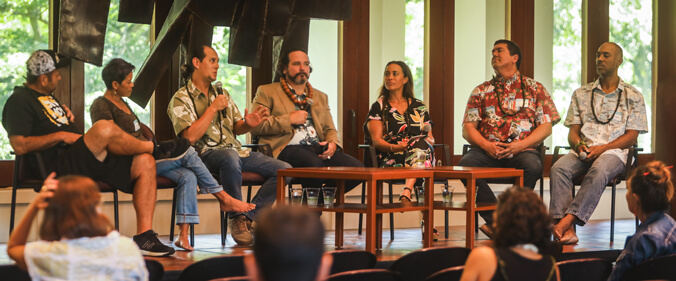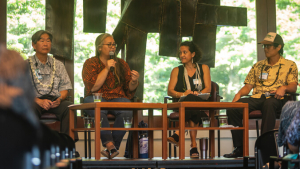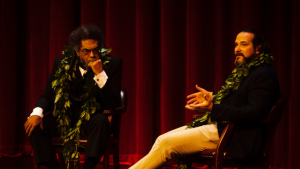
Pressing concerns surrounding the Red Hill water crisis and overall wai (water) access critical to loʻi kalo (taro patches) and loko iʻa (fishponds) across the state were at the center of a new series of forums held at the University of Hawaiʻi at Mānoa.
To foster advancing the protection of ʻāina (land) and wai through policy and law, the UH Mānoa Hawaiʻinuākea School of Hawaiian Knowledge hosted the inaugural Piʻo Summit: Wai Sovereignty and Justice on December 15, at the East-West Center. Approximately 200 participants attended the conference that brought together academic researchers from UH, esteemed community leaders and advocates to discuss ailing issues and the need to turn to ancestral innovation to help solve them.
“The university can really be a catalyst to uplift what’s happening in our community to try to link our research and our mentoring of students to actually solve real-world problems for our islands today,” said Kamanamaikalani Beamer, who is the Dana Naone Hall Endowed Chair in Hawaiian Studies, Literature and the Environment at Hawaiʻinuākea and a professor at Kamakakūokalani Center for Hawaiian Studies and the William S. Richardson School of Law.
Kaipulaumakaniolono Baker, a PhD student at UH Mānoa opened the conference with an oli (chant), followed by remarks from Hawaiʻinuākea Dean Jon Osorio and Beamer who rallied attendees to passionately chant ʻOla i ka wai, which means water is life. He also dedicated the conference to Dana Naone Hall, a kānaka maoli (Native Hawaiian) environmental activist. This was followed by the first panel focusing on the significant role wai has in feeding Hawaiʻi’s communities.
Wai sovereignty and justice
A major focus of the conference was on the current state of water management and access in Hawaiʻi and how state leaders can utilize research compiled at UH Mānoa and ʻike (knowledge) from aloha ʻāina practitioners steeped in rich wisdom passed down from kūpuna to address problems impacting the islands.
“I think here in Hawaiʻi we can really look towards our ancestral systems that solved [issues] for our islands at different scales in different times but are still very viable and valuable for our future today,” Beamer said.
Wai, ʻAi and Iʻa
The first panel featured aloha ʻāina leaders from loko iʻa, loʻi kalo and wai advocates who expressed the importance of restoring stream flow in critical areas across the pae ʻāina (Hawaiian archipelago) which can help to support the production of food and customary rights. Panelist Hōkūao Pellegrino from Hui O Nā Wai ʻEhā spoke of more than 100 streams on Maui that are currently diverted and the need to restore them.
Wai and Red Hill

The second session addressed strategies on decontaminating water impacted by the Red Hill fuel spill and revealed traditional maps listing freshwater resources on Oʻahu. The panel featured UH Mānoa Professor Kapua Sproat (Ka Huli Ao), Ernie Lau (Board of Water Supply), Wayne Tanaka (Sierra Club of Hawaiʻi) and Camille Kalama (Kaʻohewai).
Lau lamented that there are still 400 million gallons of fuel sitting over the aquifer and advocated conference attendees to push for the Navy to defuel tanks. “If another spill happens, ‘Oh my gosh, our poor wai,’” Lau said.
Special keynote

Renowned philosopher, political activist, public intellectual and author Cornel West will headline a moderated keynote discussion following the summit at Kennedy Theatre 5–7 p.m. West will speak on imperialism and the occupation of Hawaiʻi, while placing the islands within the context of peoples’ movements for liberation and justice across the world.
“Dr. Cornel West has been one of the most influential thinkers of our time when it comes to race, social justice, economic justice, and the liberation of oppressed peoples and occupied nations,” Beamer said. “He is a globally recognized philosopher and progessive activist for human rights. He is one of the most impressive speakers and academics one can witness.”
Organizers plan to host the Piʻo Summit annually with themes highlighting aloha ʻāina and sustainability, and how to advance local policy issues as well as increase collaboration. The summit is hosted by Pōʻai Ke Aloha ʻĀina, a project of the Dana Naone Hall chair, which aims to elevate aloha ʻāina practices within our community.
Event sponsors include the UH Mānoa Truth, Racial Healing and Transformation Campus Center, Native Hawaiian Student Services, Hawaiʻinuākea School of Hawaiian Knowledge, Hawaiian Theatre Program, Hawaiʻi Alliance for Progessive Action, Council for Native Hawaiian Advancement, ʻĀina Aloha Economic Futures, Kanaeokana and Sierra Club of Hawaiʻi.

